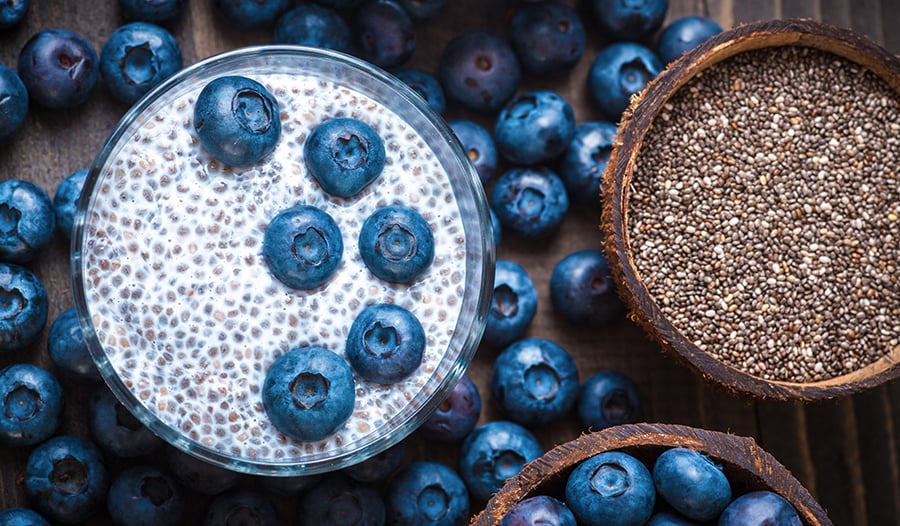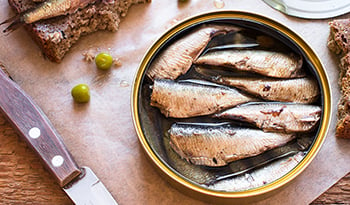Chia Seeds: 7 Incredible Benefits, Nutritional Info, + Easy Chia Pudding Recipe
DISCLAIMER:This blog does not intend to provide diagnosis...
- In this article:
- What Are Chia Seeds?
- Chia Seeds Nutrition
- Health Benefits of Chia Seeds
- Popular Uses for Chia Seeds
- Chia Pudding Recipe
- Chia Pudding Add-ins for Flavor
- How to Store Chia Seeds

Chia seeds have grown in popularity over the years, but they are not new! Chia seeds are an incredibly versatile food that has been a nutritious staple in various diets for centuries.
What Are Chia Seeds?
Chia seeds are small white or black seeds from the chia plant, part of the Lamiaceae, or mint, family. They have a nutty flavor and are free of common allergens.
Chia seeds originate from Central America, where the seed was a staple in ancient Aztec and Mayan diets. The word “chia” actually means “strength” in Mayan.
Chia seeds provide a variety of nutrients such as fiber, antioxidants, plant protein, vitamins, and minerals. They also have an incredible capacity to absorb liquid. When chia seeds are submerged in liquid, they form a gelatinous texture that can help delay gastric emptying and promote the feeling of fullness and satiety, slow the digestion and release of sugar, which helps balance blood sugar and energy levels and help absorb cholesterol and dietary toxins from the body for bowel elimination.
These nutritious, versatile seeds are incredible and a must-have kitchen staple.
Chia Seeds Nutrition
One 2-tablespoon (or 28 grams) serving of chia seeds contains 9.8 grams of fiber, 4.7 grams of plant protein, and 8.7 grams of fat. Chia seeds are also packed with vitamins and minerals! One 2-tablespoon serving of chia seeds has 14% of your daily value of calcium, 12% of your daily value of iron, 23% of your daily value of magnesium, and 12% of your daily value of zinc.1 These are just a few of the many nutritional benefits of chia seeds.
Health Benefits of Chia Seeds
In addition to fiber and protein, chia seeds contain heart-healthy omega-3 fats and antioxidants. The combination of chia seeds’ fiber content, omega-3s, and antioxidants can provide the body with many incredible health benefits.
1. Omega-3s
Chia seeds are packed with healthy fats! Omega-3 alpha-linolenic acid (ALA) makes up about 75% of the fat in chia seeds, while the remainder is composed of omega-6 fatty acids.2 Many studies have shown that omega-3 fats support heart and brain health.
2. Fiber
Consuming chia seeds is a great way to boost your intake of fiber. The American Heart Association recommends eating 20 to 30 grams of fiber daily for heart and overall health. Fiber is essential for a healthy gut microbiome. One serving of chia seeds (2 tablespoons or 28 grams) offers 9.8 grams of fiber!
3. Protein
One serving of chia seeds has 4.7 grams of protein. Proteins break down into amino acids and help the body build and repair muscles, tissues, and cells and help regulate the immune system. Compared to carbohydrates, protein digests more slowly, which can support blood sugar levels, energy levels, and satiety (the feeling of fullness after a meal or snack).
4. Antioxidants
Chia seeds are rich in antioxidants like quercetin. Quercetin can help reduce the risk of developing various diseases, including heart disease. Another antioxidant found in chia seeds is Caffeic acid, which offers anti-inflammatory benefits. Other antioxidants found in chia seeds include chlorogenic acid, myricetin, and kaempferol.
5. Gut Health
Chia seeds are rich in both insoluble and soluble fiber.3 Soluble fiber attracts water, which slows digestion and adds bulk to stool. Insoluble fiber, while also adding bulk to stool, improves elimination by helping food pass through the digestive tract.
Fiber also helps reduce inflammation. The body makes short-chain fatty acids when it digests and processes fiber. These short-chain fatty acids can help prevent pro-inflammatory bacteria from leaking through the intestinal walls, which causes inflammation within the body.4
Diets high in fiber support the growth of beneficial gut bacteria, which are essential for digestive health. The gut microbiome impacts not only digestion, but also hormonal balance, immunity, metabolism, mood, and cognitive function.
Chia seeds are a great way to boost gut health by supporting good bacterial growth and bowel regularity and reducing inflammation.
6. Heart Health
Chia seeds can help reduce inflammation, which is important because inflammation is a precursor to many diet-related diseases, including cardiovascular disease.5 An antioxidant in chia seeds known as Caffeic acid is responsible for helping fight inflammation.
Chia seeds’ gelatinous nature and high fiber content help support blood sugar levels and a healthy weight, both of which are important for heart health.
7. Blood Sugar Support
With their high fiber content, chia seeds help support healthy blood sugar levels and help control diabetes mellitus.6
Popular Uses for Chia Seeds
Chia seeds are a versatile plant-based food used in many sweet and savory recipes. Try adding chia seeds to these common, popular snacks and meals:
- Smoothies
- Oatmeal
- Yogurt
- Chia pudding
- Overnight oats
- Chia jam
- Protein bars
- Energy bites
- Cookies or other baked treats
- Sauces
- Water or juice
Chia Pudding Recipe
Homemade chia pudding is a popular way to use these healthful seeds.
In a glass jar or container, add ¼ cup of whole chia seeds and ¾ cup of liquid such as non-dairy milk. Then stir together, add a lid, and place in the refrigerator overnight. You’ll need to stir again in the morning, as it’s common for chia seeds to clump or stick together. If you prefer thinner chia pudding consistency, use 1 cup of liquid instead of ¾ of a cup of liquid.
To add more flavor to your chia pudding, add one or more of the following!
Chia Pudding Add-ins for Flavor
- Maple syrup
- Honey
- Cinnamon
- Ginger
- Nutmeg
- Pumpkin pie spice
- Cacao
- Cacao nibs
- Matcha
- Vanilla extract
- Blended fruit (blueberries, strawberries, raspberries)
- Applesauce
- Yogurt
- Pumpkin Seeds
- Ground Flaxseeds
- Walnuts
- Almonds
- Almond Butter
- Peanut Butter
Wait until morning to add fresh fruit, nuts, or seeds to your chia pudding to prevent these ingredients from becoming soggy in the fridge overnight.
How to Store Chia Seeds
Store chia seeds in a glass jar in the refrigerator. Once the bag of chia seeds is opened, storing in the fridge (versus the pantry) ensures that chia seeds are not exposed to air, light, or heat, which can increase the risk of the seeds going rancid or being infested with bugs. Chia seeds can also be stored in the freezer.
In conclusion, chia seeds are a nutritious, versatile, plant-powered food to add to your daily meals and snacks!
References:
- USDA FoodData Central: Seeds, chia seeds, dried — https://fdc.nal.usda.gov/fdc-app.html#/food-details/170554/nutrients
- Ixtaina, Vanesa & Martínez, Marcela & Spotorno, Viviana & Mateo, Carmen & Maestri, Damián & Diehl, Bernd & Nolasco, Susana & Tomás, Mabel. (2011). Characterization of chia seed oils obtained by pressing and solvent extraction. Journal of Food Composition and Analysis. 24. 166-174. 10.1016/j.jfca.2010.08.006.
- Slavin J. Fiber and prebiotics: mechanisms and health benefits. Nutrients. 2013;5(4):1417-1435. Published 2013 Apr 22. doi:10.3390/nu5041417
- Myhrstad MCW, Tunsjø H, Charnock C, Telle-Hansen VH. Dietary Fiber, Gut Microbiota, and Metabolic Regulation-Current Status in Human Randomized Trials. Nutrients. 2020;12(3):859. Published 2020 Mar 23. doi:10.3390/nu12030859
- Sorriento D, Iaccarino G. Inflammation and Cardiovascular Diseases: The Most Recent Findings. Int J Mol Sci. 2019;20(16):3879. Published 2019 Aug 9. doi:10.3390/ijms20163879
- Ullah R, Nadeem M, Khalique A, et al. Nutritional and therapeutic perspectives of Chia (Salvia hispanica L.): a review. J Food Sci Technol. 2016;53(4):1750-1758. doi:10.1007/s13197-015-1967-0

 By Megan Roosevelt, RDN
By Megan Roosevelt, RDN


